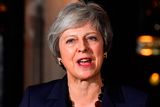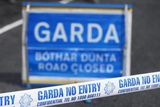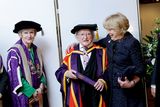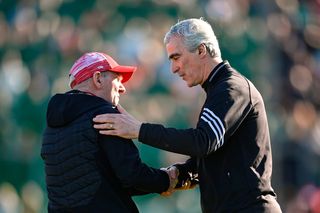'Major win for Ireland' as Brexit deal agreed
After tense Cabinet meeting, May now faces battle to get deal through parliamentBritish junior minister this morning quit May's governmentDUP lawmaker says party will 'certainly' vote against May Brexit deal

A Brexit deal that ensures no hard Border on this island has been hailed as a major victory for Ireland.
While Taoiseach Leo Varadkar said Brexit is "something we regret", he insisted the best possible Withdrawal Agreement has been negotiated.
He said other EU members had taken on Irish concerns and helped protect the peace process, the common travel area and our economy.
"This is one of the better days in politics," he said.
Mr Varadkar praised British Prime Minister Theresa May for being "true to her word" by ensuring there will be no hard Border.
However, Mrs May is still facing a massive battle to get the deal through the UK parliament in the coming weeks.
She used a tense five-hour meeting in London yesterday to convince her ministers that the deal is the only reasonable way forward. She said it was the only way to avoid a disorderly exit from the EU or "no Brexit at all".
However, doubt still hangs over her ability to get the deal passed by parliament. A third of her ministers spoke against it.
This morning, Shailesh Vara has quit as Northern Ireland Minister, saying he cannot support Theresa May’s Brexit agreement, which he said “leaves the UK in a halfway house with no time limit on when we will finally be a sovereign nation”.
The deal includes an Irish protocol which ties Northern Ireland to the EU's customs union indefinitely.
It commits the UK to protecting "North-south co-operation and its guarantee of avoiding a hard Border, including any physical infrastructure or related checks and controls, and bearing in mind that any future arrangements must be compatible with these overarching requirements".
The UK and EU have agreed to a 'backstop' whereby Northern Ireland will maintain "full alignment" with the rules of the EU's internal market and the customs union "unless and until an alternative arrangement implementing another scenario is agreed".
Asked whether the guarantee of a soft Border was "cast iron", as claimed last December, Mr Varadkar said: "This is even stronger than what we had back in December."
He described the talks as "a difficult experience for everyone involved" but praised Mrs May's integrity.
At the same time, the protocol says nothing "prevents the UK from ensuring unfettered market access for goods moving from Northern Ireland to the rest of the United Kingdom's internal market".
The common travel area, which allows Irish people travel freely back and forth to Britain, has also been preserved. Although not legally necessary, the Cabinet has decided to have a vote on the deal in the Dáil.
But it is the vote in Westminster that will decide whether Mrs May's negotiating tactics have worked.
She told her cabinet that the 585-page document makes it clear that the integrity of the UK is maintained. Although there was dissent, her ministers rowed in behind the draft divorce package after a "long, detailed and impassioned" marathon meeting.
Mrs May referred to the support from her cabinet as a "collective agreement". However, according to cabinet sources, 10 ministers - equivalent to a third of the UK cabinet - spoke out against the plans during furious exchanges.
One source described a "massive bust-up" between Mrs May and Esther McVey, work and pensions secretary. Ms McVey is understood to be one of three ministers who are considering their positions.
Meanwhile, Mrs May could face a leadership challenge as early as today as unhappy backbench MPs called for a confidence vote. The support of 48 MPs will be needed to mount a challenge.
Leading Tory Eurosceptic MP Jacob Rees-Mogg - tipped by some as Mrs May's possible replacement as leader - called for revolt on Tory backbenches.
In a letter to colleagues, Mr Rees-Mogg said the deal would see the UK hand over £39bn to the European Union for "little or nothing in return".
"For these reasons, I can not support the proposed agreement in parliament and would hope that Conservative MPs would do likewise," he wrote.
Speaking outside Downing Street last night, Mrs May claimed the deal was "the best that could be negotiated", adding it was "a decisive step which allows us to move on and finalise the deal in the days ahead".
"I firmly believe, with my head and my heart, that this is a decision which is in the best interests of the United Kingdom," she said.
But the real test for Mrs May will be if she can pass this deal through the House of Commons.
Last night, her close allies began contemplating how to assemble the 320 votes deemed necessary to be sure of winning a Brexit vote.
Mrs May's chances of achieving this target when the issue comes before parliament next month appear poor at this early stage.
She will definitely lose many of her party's 315 MPs, and the 10 DUP members have already stated they cannot support the deal.
Earlier, Mrs May told the House of Commons that the draft deal "takes us significantly closer to delivering what the British people voted for in the referendum" of 2016 that triggered Brexit.
But the DUP, which props up her minority government, last night looked set to abandon Mrs May.
DUP leader Arlene Foster warned the prime minister: "She has said that she will not break up the United Kingdom, there will be no difference between Northern Ireland and the rest of the United Kingdom.
"If she decides to go against all of that, then there will be consequences."
In a bid to help Mrs May keep the DUP on board, Mr Varadkar also offered an olive branch last night, saying: "Our approach is not intended in any way as a threat to you, or to your identity. We never wanted Brexit. Our goal is simply to protect the peace and the Good Friday Agreement from any unintended or undesirable consequence."
He said Ireland and the EU "fully respect the constitutional status of Northern Ireland as part of the United Kingdom, and that this can only change if the majority of people in Northern Ireland want it".
Germany and France were among the first EU countries to welcome the breakthrough, with German Foreign Minister Heiko Maas saying it was "a great relief".
In Brussels, the EU's negotiator Michel Barnier said a Brexit deal would prevent the return of any "hard Border" in Ireland by allowing all the United Kingdom to remain within a customs union.
"We have now found a solution, along with the UK, to avoid a hard Border on the island of Ireland," he said.
He added that a special North "backstop" would only be used if the two sides fail to reach a broader agreement within a 21-month transition.
"If we are not ready by July 2020, we could jointly decide to extend the transition to provide for more time," he added.
"Only if, and the end of transition extended or not, we are still not there with the future agreement would the backstop decision agreed today kick in."
The European Parliament's key representative on Brexit, Guy Verhofstadt, welcomed the draft Brexit agreement.
He said it will allow the UK to leave the EU, while keeping a close relationship with the bloc, protect citizens' rights, and avoid a hard Border in Ireland.
Join the Irish Independent WhatsApp channel
Stay up to date with all the latest news















